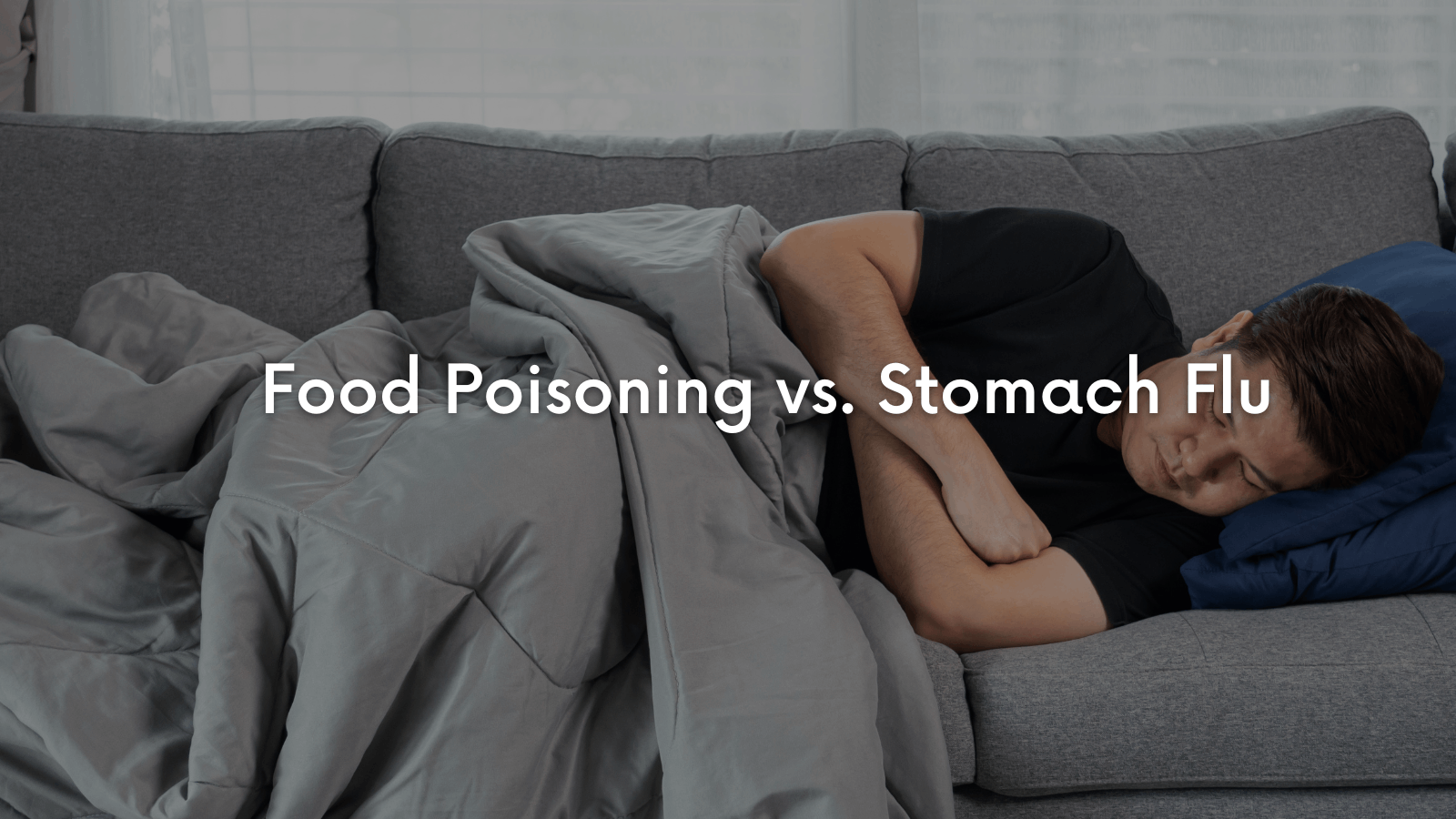
Stomach Flu vs Food Poisoning: Causes, Prevention, and Recovery Tips
March 19, 2025
Whether you are feeling nauseous, experiencing diarrhea, or dealing with unbearable gastrointestinal pain, there’s nothing pleasant about an upset stomach. Experiencing nausea, vomiting, and diarrhea can be distressing; you may be wondering whether you are experiencing stomach flu vs food poisoning. While both conditions affect the digestive system, they have different causes, symptoms, and treatments.
In this piece, we will break down the causes, symptoms, remedies, and prevention tips of food poisoning vs stomach flu. Understanding the difference between the two can help you manage symptoms effectively and know when to seek medical care. Let’s explore!
What is Stomach Flu?
The stomach flu (stomach bug), also known as viral gastroenteritis, is caused by viruses like norovirus or rotavirus. Stomach flu is an intestinal infection; it happens when our stomach and intestines become inflamed. The inflammation is caused by infection of the immune system.
It can be spread through contaminated food, water, or close contact with an infected person. Signs of stomach flu include:
- Nausea and vomiting
- Watery diarrhea
- Low-grade fever
- Abdominal cramps
- Body aches and fatigue
- Loss of appetite
- Mild dehydration
Causes of Stomach Flu
Also known as viral gastroenteritis, stomach flu is caused by viral infection. However, it can also result from contaminated food or surfaces. It can be spread by consuming contaminated food or water and sharing food, utensils, or towels with someone with the virus. The viruses responsible include:
- Norovirus: Highly contagious and spreads rapidly in close quarters.
- Rotavirus: Affects infants and young children more severely.
- Adenovirus: Can cause prolonged gastrointestinal symptoms.
Stomach Flu Treatment
Stomach flu conditions can leave you feeling weak and dehydrated. While there’s no instant cure to this, effective treatment can help manage and quicken recovery. From staying hydrated to eating easy-to-digest foods, knowing how to care to prevent stomach viruses can make a big difference. Here’s what you need to do to feel better and prevent complications.
- Drinking plenty of fluids to prevent dehydration
- Resting to help your immune system fight the virus
- Eating bland foods to avoid irritating the stomach
- Using over-the-counter medications for fever and discomfort (consult a gastroenterologist first)
What is Food Poisoning?
Food poisoning is a type of foodborne illness caused by consuming germs or other food or drinks that contain bacteria, viruses, or toxins. Products like raw meat, raw eggs, or unpasteurized milk can cause food poisoning. Common food poisoning symptoms include:
- Severe diarrhea
- Vomiting and nausea
- High fever
- Abdominal cramps
- Dehydration and weakness
- Chills and sweating
- Headaches and dizziness
Causes of Food Poisoning
Food poisoning occurs due to consuming contaminated food, leading to severe dehydration and weakness. Bacteria, viruses, parasites, and toxins are the most common culprits, often spreading through improper food handling. Understanding the causes of food poisoning can help you take the right precautions to stay safe and avoid the discomfort of foodborne illnesses. Causes of food poisoning include:
- Bacteria: Salmonella, E. coli, Listeria, and Campylobacter
- Viruses: Norovirus and Hepatitis A
- Parasites: Giardia and Cryptosporidium
- Toxins: Found in improperly stored or cooked foods
Food Poisoning Treatment
Mild cases of stomach virus can be treated at home, but severe dehydration or persistent symptoms may require medical attention. Treatment includes:
- Drinking fluids to replace lost electrolytes.
- Resting to allow the body to recover.
- Avoiding dairy, fatty foods, and caffeine.
- Taking probiotics to restore gut health.
- Seeking medical help if symptoms persist beyond 48 hours.
Key Difference between Stomach Flu vs Food Poisoning
| Factor | Stomach Flu | Food Poisoning |
| Cause | Viral Infection | Bacteria, viruses, or toxins |
| Onset | Develops gradually | Symptoms appear quickly |
| Fever | None or low-grade | High-fever may occur |
| Duration | 2-7 days | 24-48 hours |
| Contagious | Yes, spreads easily | No, unless in contact with bacteria |
Ways to Manage Symptoms of Stomach Flu vs Food Poisoning at Home
Regardless of whether you have stomach flu vs food poisoning symptoms, we will share plenty of remedies to help you recover faster.
Drink Plenty of Fluids
Dehydration is a major concern when a patient is ill with stomach flu or food poisoning. Incorporate more herbal teas and electrolyte-rich drinks like coconut water in your diet.
Intake Bland Foods
Once nausea subsides, opt for the best foods for stomach flu. Foods to eat for stomach flu are:
- Bananas
- Rice
- Applesauce
- Toast
- Plain crackers
- Oatmeal
- Boiled potatoes
- Bone broth
These are some of the best foods for stomach flu and food poisoning recovery.
Rest & Recover
Resting and getting enough sleep gives your body enough time to heal. Sleep helps strengthen the immune system, eventually speeding up the recovery. Make sure you do not engage in strenuous activities and allow your body to heal.
When to Seek Medical Advice for Stomach Flu and Food Poisoning
As home remedies for food poisoning and stomach flu are highly effective, medical help will be needed in case of serious symptoms. Visit a doctor if you experience:
- Severe dehydration (dry mouth, dizziness, dark urine)
- High fever above 102°F
- Bloody diarrhea or vomit
- Symptoms lasting more than 2 days
- Severe abdominal pain that doesn’t improve
Prevention of Food Poisoning vs Stomach Flu
As aforementioned, stomach flu vs food poisoning generates similar symptoms, however, their prevention methods differ. Preventing these conditions requires proper hygiene, safe food handling, and awareness of how they spread. A few prevention tips include:
- Wash hands frequently.
- Avoid close contact with infected individuals.
- Disinfect commonly touched surfaces.
- Eat well-cooked items at safe temperatures.
- Wash fruits and vegetables thoroughly.
- Avoid consuming expired or raw food.
- Keep kitchen surfaces and utensils clean.
- Be cautious when eating at restaurants or street vendors.
Conclusion
Both stomach flu vs food poisoning are uncomfortable medical conditions that will affect your everyday routine. Knowing the key symptoms and causes can help with the proper treatment of digestive diseases. If you are dealing with any stomach bug or food poisoning symptoms, focus on hydration and rest. By following preventive measures, you can reduce your risk of getting sick and maintain good digestive health.
If you are experiencing any symptoms of stomach flu or food poisoning, consult a doctor at the Digestive Institute of Arizona today!
FAQs
1. How do I know if I have food poisoning?
Food poisoning symptoms usually arise quickly after an individual is infected. Common signs include vomiting and diarrhea with stomach cramps.
2. What to eat when dealing with stomach flu?
When recovering from stomach flu or other digestive-related conditions, consume lighter food and plenty of healthy drinks (no carbonated beverages). Also, avoid dairy, spicy, or greasy food until your stomach settles.
3. What are the signs of food poisoning in kids?
Children with food poisoning may experience vomiting, diarrhea, stomach pain, fever, sunken eyes, and weakness. Additionally, dehydration can be a major concern. If symptoms are severe and persistent, seek medical attention immediately.
4. Can food poisoning cause constipation?
While food poisoning commonly leads to diarrhea, it can cause constipation as well in more extreme cases.
